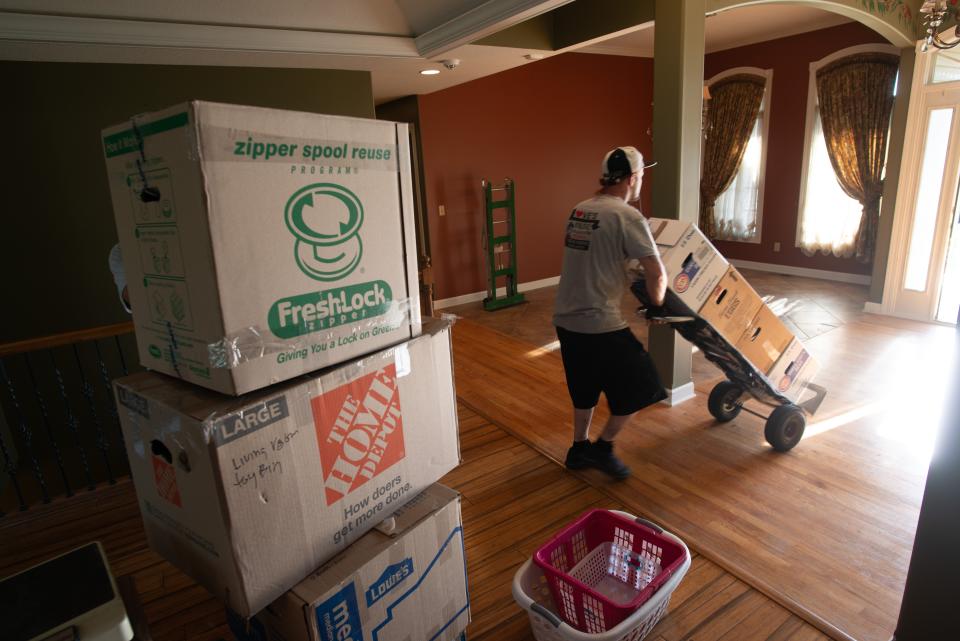Don't want to lug that couch down the stairs yourself? Here's how to find safe movers
There are ways to research a moving company before you make your big move – and to make sure you don't run into problems.
The Federal Motor Carrier Safety Administration (FMCSA) has a website, www.ProtectYourMove.gov, which provides a lot of educational information for consumers.
Any mover that is moving intrastate, or across state lines, must also have a Department of Transportation registration number, which can be searched on the Protect Your Move site, said Ryan Bowley, the American Trucking Associations’ moving and storage executive director. Moves within a state are regulated by state authorities.
If a company is not registered with a DOT number, that is a large red flag, he said.
Cicely Waters, director of the office of communications for the FMCSA, said the agency tries to focus on consumer education ahead of a move.
"Watch out for red flags and know your rights," she said. "If something doesn't feel right, then it's probably not."

Considering relocation? Check out USA TODAY Homefront for the latest tips, reviews and suggestions for your big move.
In addition to researching ahead of time for the company’s names on sites like the Better Business Bureau, some companies may re-invent themselves to avoid trouble. To protect yourself, search a company’s phone number to see if any alerts pop up.
The FMCSA also has a dispute resolution section for consumers. The organization takes consumer complaints to determine what companies it should investigate but does not have the staff to resolve individual complaints.
Following the three “R’s” can help proactively protect a move, Bowley said.
◾ Recognize the qualities of a reputable mover and the difference between a mover and a broker; a broker will book a move and then sell the job to another company. Check to make sure the broker is registered.
◾ Research the moving companies you are considering and only use registered movers.
◾ Read key documents from the DOT and all information provided by the mover.
Bowley said it’s important to understand whether you have an estimate or a “bill of lading,” which is a contract. There are also differences between a binding estimate and a nonbinding estimate. A nonbinding estimate would be based on the weight of goods and there is a 110% rule, meaning any increase in cost cannot exceed 110% of the original estimate, he said.
All price changes have “to be agreed to between you and your moving company before things get on the truck,” he said.
Protect yourself: Couple's furniture was held hostage, what to do to protect your move
Here are some more tips from Bowley’s organization:
◾ Get at least three in-home estimates. Reputable movers will want to see your home and goods before giving you an estimate, Bowley said. An in-person visit is best, but a video visit is also OK.
◾ Know your rights and obligations as a consumer. Moving companies must provide two documents for an interstate move: “Ready to Move?” and “Your Rights and Responsibilities When You Move.”
◾ Avoid large down payments. Some movers may ask for a small deposit to hold a date, but a company that asks for a large deposit or full payment, especially in cash or through a service like Venmo, is a red flag.
◾ Read all paperwork and never sign a blank document. Keep copies of all paperwork, especially the bill of lading, which is the contract between you and your mover.
◾ Consider liability options and valuation. Make an informed choice of liability protections when booking your move, the organization said, and always take valuable documents and other items with you.
Betty Lin-Fisher is a consumer reporter for USA TODAY. Reach her at blinfisher@USATODAY.com or follow her on X, Facebook, or Instagram @blinfisher. Sign up for our free The Daily Money newsletter, which will include consumer news on Fridays, here.
This article originally appeared on USA TODAY: Hiring movers? Here's how to vet your moving company for security

